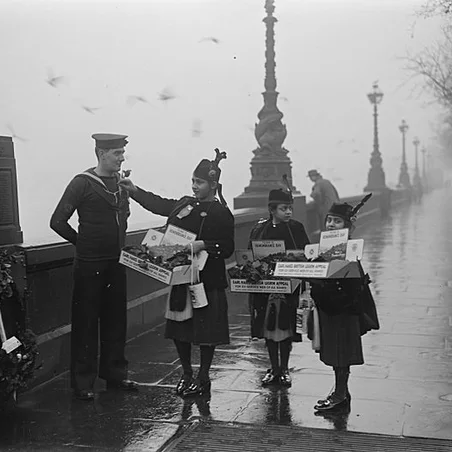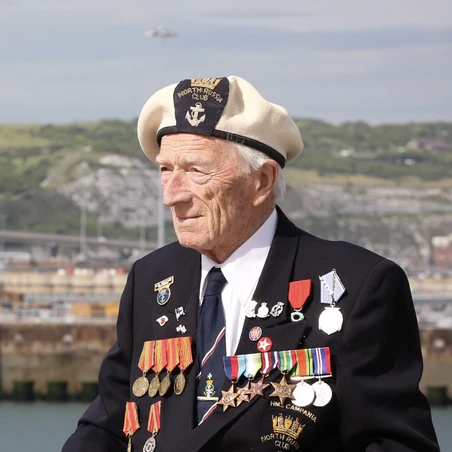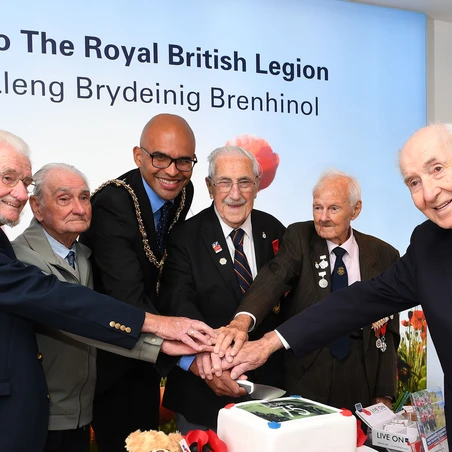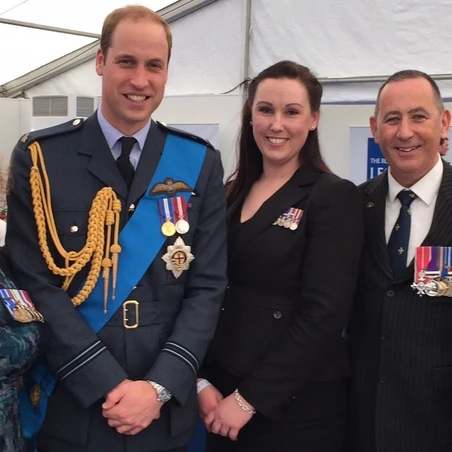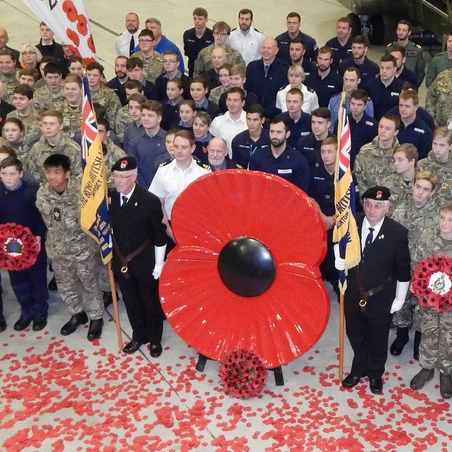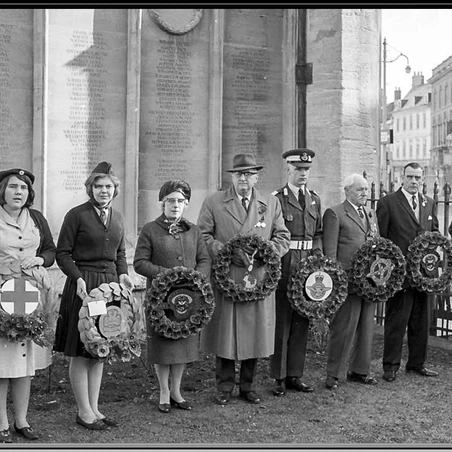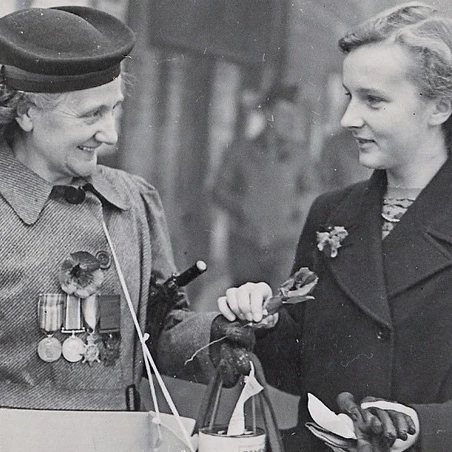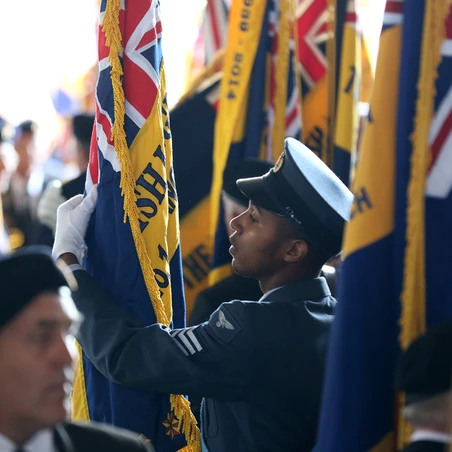Our branch network extends across Europe and as far afield as Chile, Thailand and Japan.
See how overseas branches help connect Armed Forces communities across the world and help us remember those who have served and sacrificed together as one.
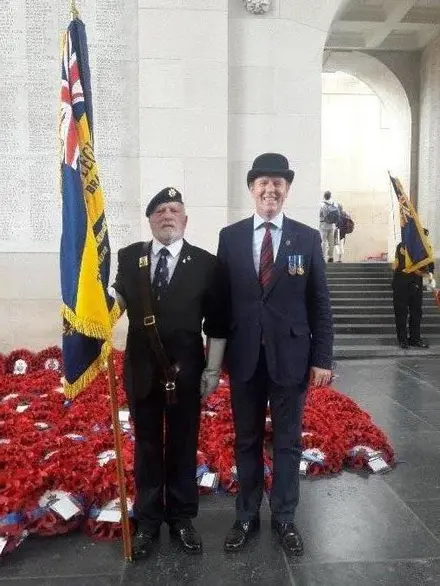
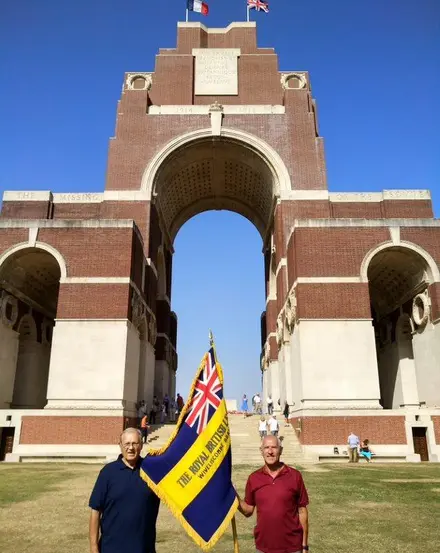
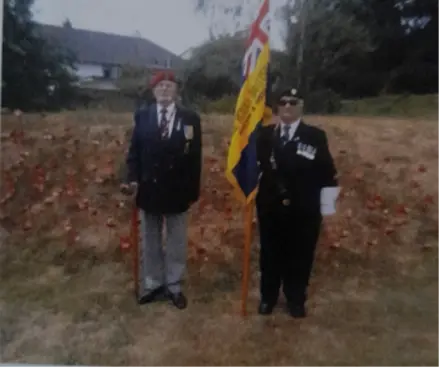
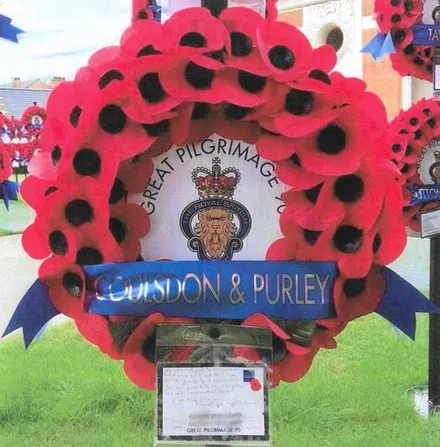
Great Pilgrimage 90
In 1928, British Legion members and ex-servicemen from the First World War travelled to the battlefields of France and Belgium. The pilgrimage allowed families of those who had lost their lives in the First World War, as well as veterans who had fought there, to return to the battlefields of France and Belgium to remember the sacrifice that had been made there 10 years previously. The British Legion organised for over 11,000 men and women to travel across the Channel and stay with welcoming, local families for three days of Remembrance by visiting graves of loved ones and honouring the fallen at the Menin Gate, Ypres. This was known as The Great Pilgrimage.
In 2018, once again, thousands of members, standard bearers, families and friends made the voyage across to Europe in a recreation of the momentous event of 1928, once again paying tribute to those who had fought there 100 years before. For so many members and veterans, it was an honour and privilege to be a part of commemorating the end of the First World War as well as reliving the amazing achievements that the RBL had accomplished 90 years previously.
Major Mike Moran from Wiveliscombe Branch visited the Thiepval Memorial which represents the missing men from the Somme and is the largest Commonwealth war memorial in the world, he says "Being part of such a historic event, representing Wiveliscombe Branch in commemorating those that lost their lives in the First World War, was an honour and something I will never forget."
Representatives visited key battlefields and cemeteries in France and Belgium just as the pilgrims of 1928 had done. Reg Wilkinson recalled how poignant the visit was, "As I stood there at Tyne Cot and surveyed the sea of white headstones…I shed a few tears, knowing that beneath my feet was a son who gave his life for his King and Country, never to return home." On the final day, branches paraded their standards through the Menin Gate, just as had been done in 1928, and wreaths were laid at a Remembrance service in Ypres, many with messages from local communities or poems from school children.
*Images: Reg Wilkinson and Anne Kay Brixton Branch Devon in Ypres | Coulsdon Wreath | Mike Moran and Stephen Wort Wiveliscombe Branch | Brian Bayley and Alan Stromberg Holt Branch.
Paris branch rekindles the flame of Remembrance
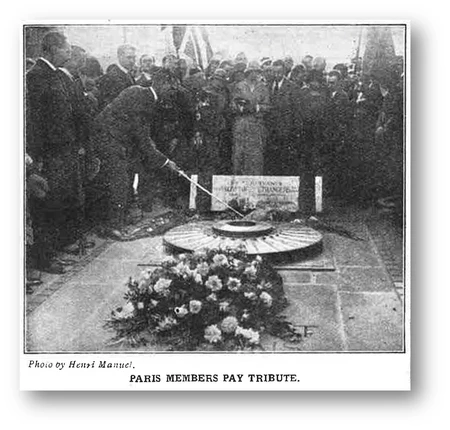
Remembering the Unknown Soldier
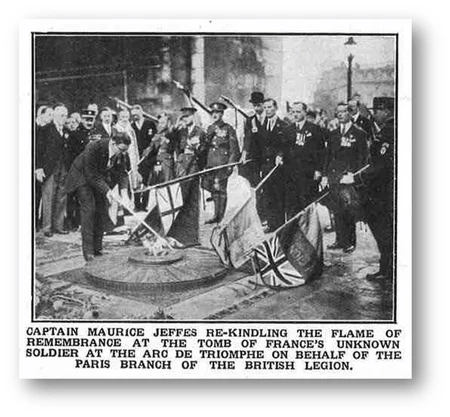
Assembling at the end of the Champs Elysees, they march to the Unknown Soldier's Grave, under the Arc de Triomphe. A ceremony is held in which a wreath is placed bearing the inscription “La Legion vivante a l'honneur de saleur la Legion disparue.” – "The living Legion has the honour of greeting the missing Legion."
The eternal flame at Arc de Triomphe
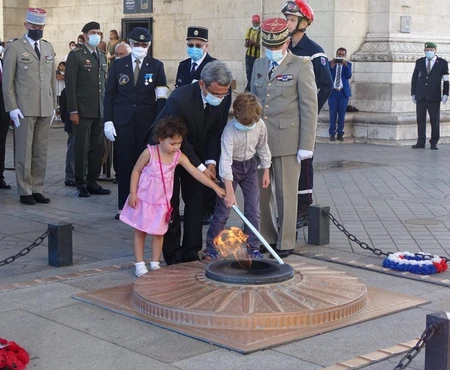
Reviving the Flame of Remembrance
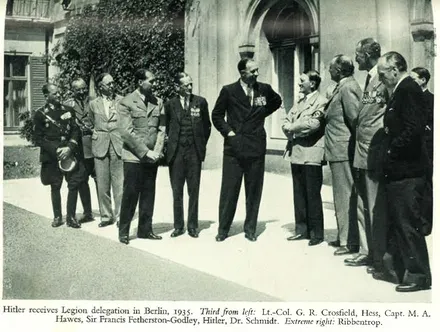
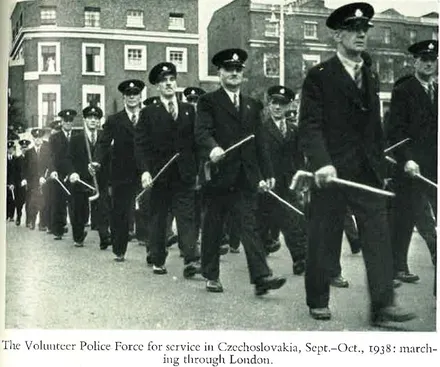
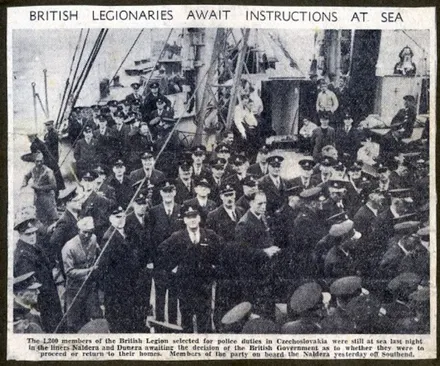
British Legion Volunteer Police Force
In 1938 the British Legion, with the permission of the Prime Minister, established a volunteer police force comprising 10,000 ex-Servicemen to take up station on the Sudenten border of Czechoslovakia, known as the “Plebiscite areas.”
The police force was to be unarmed and used to protect the population in the border areas. Leaders of the British Legion met with the German Government to discuss the offer, and the British Legion police force was pulled together and even boarded ships in preparation for their deployment. However, after two days waiting in dock to set sail from Southend, the true intentions of Germany’s Nazi party were recognised. The force disembarked from the boats and the police force stood down. These men would soon be preparing for the Second World War.
*Images: Hitler receives Legion delegation in Berlin, 1935 | The Volunteer Police Force for service in Czechslovakia, Sept - Oct 1938 marching through London. | British Legionaries await instructions at sea: The 1200 members of the British Legion selected for police duties in Czechslovakia were at sea awaiting decision of the British Government as to whether they were to proceed or return to their homes.
Sampford Peverell and Uplowman branch
.jpg?sfvrsn=aa007219_4&method=ResizeFitToAreaArguments&width=450&height=450&Signature=72D63331948AA3E279B38ED17BAE56EE8F8730D0)
During their stay, the French veterans presented the prestigious Croix des Combattants medal to the retiring Chairman of Sampford Peverell and Uplowman branch, Jim Fear. This was to honour the sacrifices made by British soldiers who died or were injured at the Battle of the Somme in the First World War.
Croix des Combattants Medal
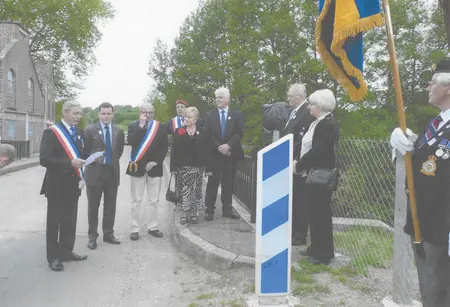
Honouring British soldiers who died in Fervaques
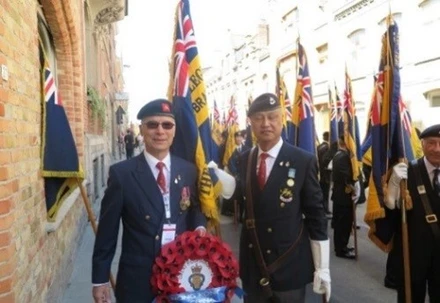
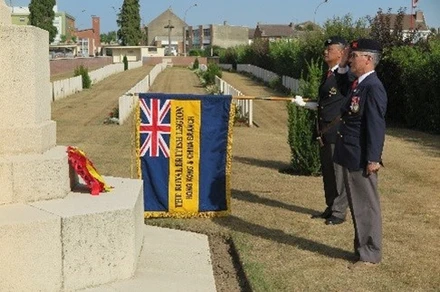
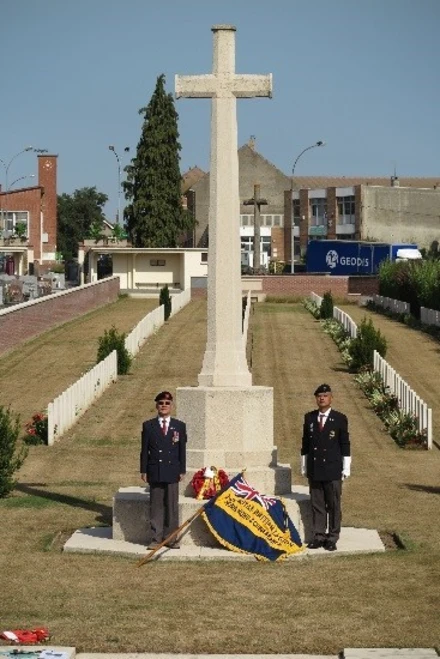
Great Pilgrimage 90 Hong Kong & China Branch
As part of the Royal British Legion’s ‘Thank You’ campaign in 2018, the Hong Kong and China Branch sent a party of members to Europe at the time of the GP90 celebrations. The Great Pilgrimage was a coming together of branches, members, and supporters from all over the world to follow in the footsteps of those who had made the journey to Flanders in 1918. Attendees gathered in Ypres on 8 August where standards marched through the Menin Gate before going onto the battlefields where so many men lost their lives.
For the Hong Kong and China branch, this journey allowed the RBL to thank and commemorate the men of the Chinese Labour Corps (CLC) who died in the service of the Allies. They rarely took up arms, but over 2,000 men of the CLC died working as stevedores and railway porters ferrying munitions to the frontline, in ammunition depots, as mechanics putting tanks back into battle and in the unenviable task of cleaning up the battlefields, burying the dead.
The branch representatives visited 17 of the 44 cemeteries in Belgium, France, and England where men of the CLC are buried. At each, they laid a wreath or flowers with a card from the branch in both Chinese and English saying ‘Thank You’. At three of the cemeteries, the branch standard was unfurled, and a minute’s silence was observed.
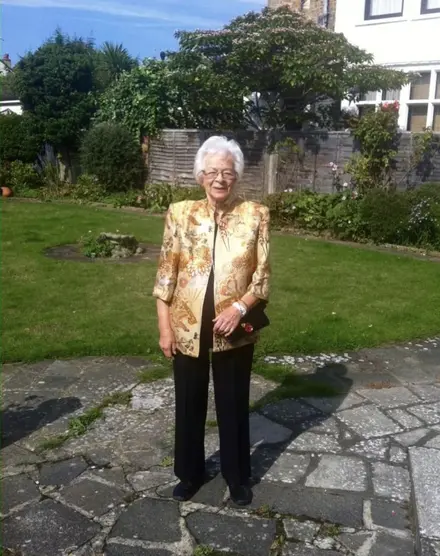
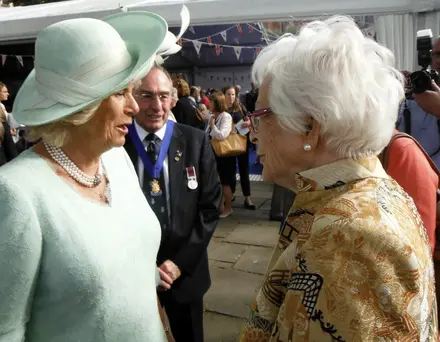
Mildred Tunbridge
The Japanese invaded South-East Asia, in the Second World War, capturing around 50,000 British prisoners of war including civilians. They were held in appalling conditions. Mildred Tunbridge was interned with her mother and siblings in Lunghua Camp, Shanghai, for three years, on account that Mildred’s father had been British despite never having been to Britain themselves. Surviving the camps, the family eventually arrived in England in 1947, effectively as refugees.
In 1951, £48.50 was paid to civilian camp survivors as compensation, using money from the sale of Japanese assets. However, a civilian did not qualify unless they had been a British resident in the UK before internment, and so Mildred’s family and thousands like them were denied compensation for their maltreatment.
In the 1980s, Mildred would hold talks about camp conditions and lobbied Parliament for fair compensation, supported and organised by the Royal British Legion and the Association of British Civilian Internees - Far Eastern Region. Key debates in the House of Commons were held between May 1995 and June 2000 but no decision was made. In September 2000, RBL wrote to the Secretary of State for Defence to complain of delay in concluding the review and to threaten another mass lobby of MPs. Eventually, on 7 November 2000, after years of campaigning by the RBL, ABCIFER, and people like Mildred Tunbridge, the Government announced that payment of £10,000 would be made “to each of the surviving members of the British groups who were held prisoner by the Japanese during the Second World War, in recognition of the unique circumstances of their captivity”.
Mildred’s granddaughter, Laura Pett, was inspired by her grandmother and RBL’s campaign, and today is Head of Public Affairs and Campaigns at RBL. Having sat on the working group for the VJ70 commemorations, Laura escorted her grandmother, then aged 90, down Whitehall as part of RBL's veteran contingent. On parade, Mildred wore her late husband’s medals (Stanley Tunbridge, who fought in Burma) and a Japanese Kimono which she chose to wear as a sign of her personal reconciliation with the Japanese people.
*Images: Photograph of Mildred | Mildred meeting Duchess of Cornwall.
Kingsclere Branch’s Overseas Operations
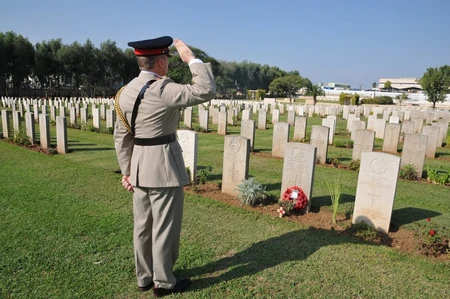
The Kingsclere branch launched “Operation Distant Shores” to commemorate the names on their village memorial, showing each man killed in action. Liaising with the British embassies in the countries where each soldier is buried, the branch arranged for wreaths to be laid at their war graves by senior officials. This included Israel, Iraq, Turkey, and Europe.
Operation Distant Shores

Part of the local community
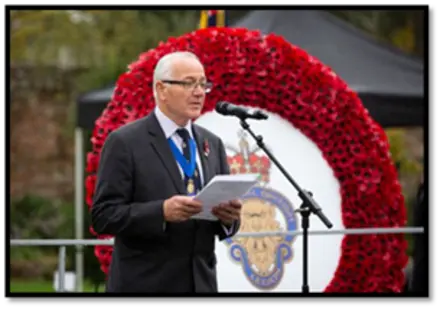
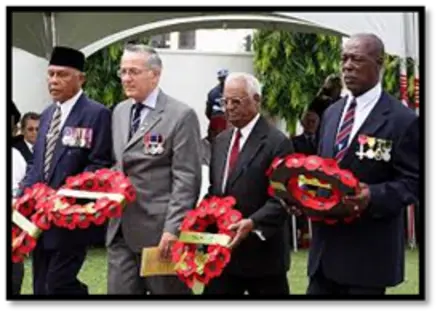
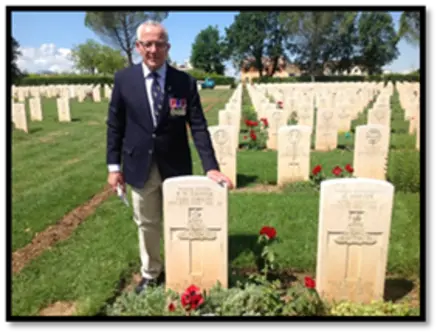
Joe Falzon’s international service to RBL
Royal British Legion National Vice-Chairman, Joe Falzon, has worked and volunteered for the RBL for 20 years after completing a 37-year career in the Army.
In 2002, Joe delivered the Royal Commonwealth Ex-Services League Conference, supporting veterans from across the world. The experience made him realise he wanted to work with international organisations, going on to become the Chairman of the RBL International Committee.
Having lived in Malta for a long period of time whilst serving, Joe had led battlefield tours around the Maltese islands. The RBL asked him to take up this mantle again in 2012 for similar tours. Since being elected as a Trustee in 2014, Joe has also led pilgrimages to Normandy and Monte Cassino.
Joe was also tasked with relocating the organisation in a move from 48 Pall Mall to Borough High Street where the head office remains today. As head of the Relocation Project Team, Joe says it was a monumental task, but he is incredibly proud to have welcomed HM The Queen to the official opening of Haig House in 2009.
*Images: Joe speaking at a Remembrance service | Representing the RBL International Committee | Leading war graves pilgrimages
Returning to Remembrance Day in South Africa
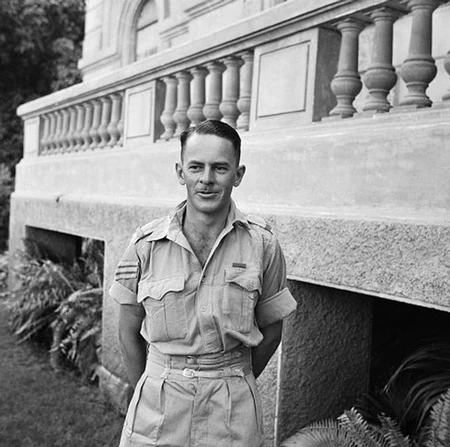
Sgt Quentin Smythe
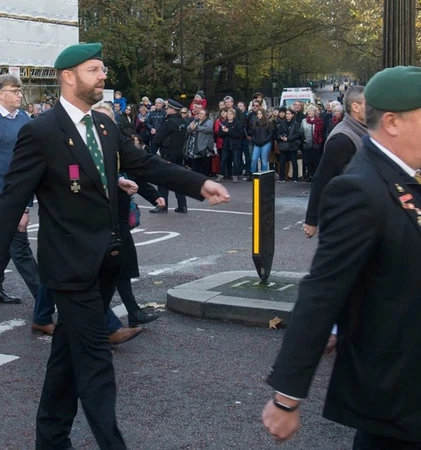
Today, Sergeant Smythe’s grandson, Legionnaire Adrian Smythe, is able to wear his grandfather’s replica medal at Cenotaph parades in London.
The return of the parade to South Africa is testament to the longstanding tradition of Remembrance and shared history embodied by the Royal British Legion, and honours the sacrifice of all who came to the aid of Britain in her hour of need.
Returning to the Cenotaph
Many South Africans attended the Cenotaph service each year until the apartheid-era nationalist Government removed South Africa from the Commonwealth in the 1960s. 50 years later, the South Africans returned through the efforts of Peter Dickens, founding Chairman of the Royal British Legion South African Branch in 2013.
Great Pilgrimage 90: A celebration of membership
.jpg?sfvrsn=9731ab61_4&method=ResizeFitToAreaArguments&width=440&height=660&Signature=09911A88BA7CF0CAA37A92834A22FE960AF976AC)

South Spain branch fundraising activities
Dorothy and David Allen moved to southern Spain in 2001. After being so involved with RBL in Essex, they were determined to take their charitable work with them.
They were soon involving their local community in their fundraising activities, such as raffles. tombola's and a tug of war competition. Dorothy and other women from the branch even starred in their own charity calendar, raising a fantastic amount of money for RBL.
Marking 60th anniversary of liberation in Wageningen, Netherlands
The 5 May is a Dutch national holiday to celebrate the liberation of the Netherlands from Nazi occupation.
On the 60th anniversary, Robert Millar attended the event in Wageningen representing the RBL Germany contingent.
Wageningen keeps the memory alive
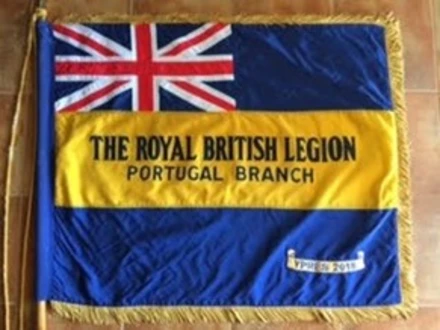
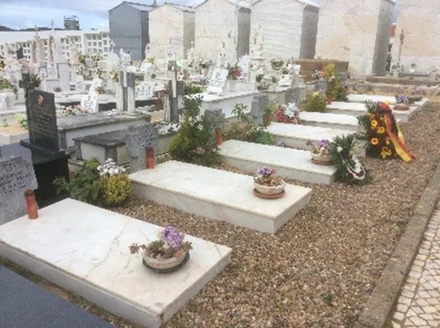
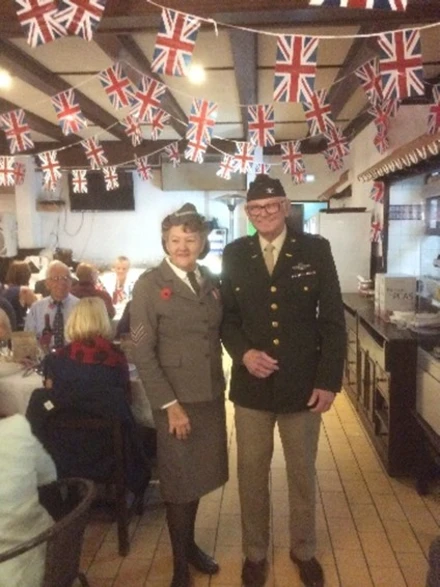
Portugal and Atlantic Islands branch
The British Old Comrades Association was formed in Lisbon, Portugal in 1920. Each year a small committee arranged a Remembrance service where wreaths were laid at the Lisbon Cenotaph and at the local memorial to the Unknown Soldier.
In 1944 Lisbon Branch oversaw many fundraising activities; lunches, parties, bridge drives, violin recitals and amateur dramatic performances. An Autumn Ball and Poppy Day dances were enjoyed.
The branch lay a wreath at Tavira every year to honour the Portuguese dead, as well as at a Remembrance service for seven German airmen who were killed trying to land their damaged aircraft on the cliffs of the Portuguese west coast.
The branch continued to evolve over the years and the British Ambassador to Portugal is now the Honorary President. The Committee consists of ten members including a Poppy Appeal Organiser who is responsible for a countrywide network of collectors. The yearly challenge is getting coins to the UK, which is usually solved by persuading a willing traveller to take them overseas once it’s all been counted and bagged.
Welfare is a key service at this RBL branch, supporting members in need. This support may include buying clothing or white goods, repatriation costs or providing air fares for relatives to attend funerals. Our experienced Welfare Co-Ordinator and a dedicated team of caseworkers provide this service.
During the Coronavirus pandemic in 2020 the branch held virtual pre-lunch drinks, giving participants the chance to share problems, swap news and gossip! A virtual VE Day celebration was held with members sharing Second World War memories and a singalong with the late great Vera Lynn. Event planning for 2021 is well on its way too, with a dinner dance for VE Day, a brass band concert and a Christmas lunch on the cards when restrictions are lifted. What a party!
*Images: RBL Portugal branch Standard flag | The Seven German graves in Portugal | In 2019 the branch held a dinner dance for D-Day 75. Suzanne Wilson, their own ‘Forces Sweetheart,’ is a favourite at events. The US Air Force ‘Bird Colonel’ is actually a retired member of the RAF.
German branch wins Noel Rogers trophy
The Germany based Paderborn branch of the Royal British Legion wins the Noel Rogers Trophy for the 4th year in a row. The Trophy is awarded to the overseas branch that raises the most money, per member, during the Poppy Appeal. €31,400 was raised by the branch which equates to £80 per Branch member.


.jpg?sfvrsn=1fc023b0_4&method=CropCropArguments&width=600&height=450&Signature=8EC69E8E38F0B9D62CB78C87B964B65D91877F43)


